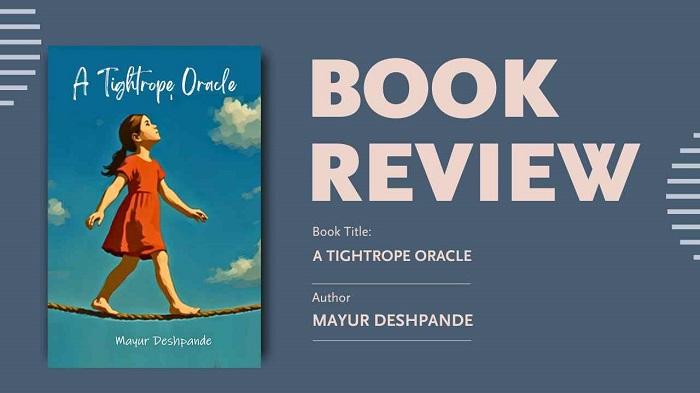
Book Review: A Tightrope Oracle by Mayur Deshpande
Mayur Deshpande’s A Tightrope Oracle is a poignant and evocative debut novel that blends realism with a touch of the supernatural, all while anchoring its story in the social, cultural, and emotional landscape of India’s marginalized communities. At its core, the book is a meditation on fate, choice, morality, and the burden of having power in a world that barely listens to the powerless.
The novel A Tightrope Oracle follows Sarsi, a young girl from the impoverished Javmalsi community, whose life revolves around her family’s street performances. Her father Rameshwar, a devout and loving man, plays the role of both breadwinner and believer, guiding his daughter through the rigors of performance life and spiritual resilience. Sarsi’s tightrope walking—dangerous, delicate, and deeply symbolic—becomes a metaphor for her journey through a world that constantly teeters between hope and despair.
The narrative takes a gripping turn when Sarsi, during a street performance, glimpses a fatal accident moments before it happens—through the reflection of a car windshield. Her warning saves lives and reveals a strange new ability: she can see glimpses of the future, but only through reflections. What starts as a moment of inexplicable insight soon becomes a powerful gift, or curse, depending on how one chooses to interpret it.
Deshpande’s treatment of Sarsi’s gift is nuanced and intelligent. He doesn’t turn her into a spectacle or a superhero. Instead, she remains grounded, unsure, even conflicted, about the ethical implications of using her foresight. The moral dilemmas she faces are at once intimate and universal: Can one change the future without unintended consequences? Is it moral to profit from a gift that could potentially save lives? Should one intervene in fate at all?
Sarsi’s parents, especially her father, represent a generation of believers who see divine purpose in unexplained phenomena. Rameshwar’s faith that his daughter is sent by Lord Vishnu is heartfelt, yet never forced. It speaks to the deep spirituality of India’s working-class families, whose resilience often stems from faith. At the same time, Deshpande allows Sarsi to question this narrative, carving a space for her independent voice.
One of the strengths of the book lies in its refusal to glorify or romanticize poverty. Deshpande paints a deeply empathetic portrait of the Javmalsi community—its rituals, its struggles, its quiet endurance. The women in the story, in particular, stand out as agents of resilience. When injustice strikes, it is not divine intervention but collective courage and solidarity that bring change. The scenes where they unite to fight legal battles against political oppression are both emotionally stirring and socially relevant.
The entry of secondary characters like Shamu, Sarsi’s gentle and loyal husband, adds emotional depth. Their relationship is one of mutual respect and subtle growth, and his near-death experience, thwarted only by Sarsi’s vision, is both thrilling and touching. In contrast, the introduction of Atul Mishra, a morally bankrupt businessman who tries to exploit Sarsi’s gift for financial gain, brings in the darker shades of human greed. His eventual downfall and death serve as a warning—both to Sarsi and the reader—that even the noblest powers can attract corrupting forces.
As Sarsi’s visions grow darker and more complex, the story shifts from personal to political. The narrative doesn’t shy away from portraying systemic injustice. The wrongful arrests of men from her community and the demolition of their livelihood expose the fragility of life on the margins. Sarsi’s limitations—her inability to prevent all tragedies, her visions’ unpredictable nature—underscore a sobering truth: power alone cannot fix a broken world.
Yet, the book also offers hope. Not through grand gestures, but through small acts of kindness, courage, and solidarity. The final chapters, involving the tragic fate of Nathu—a boy whose innocence is lost to a life of crime—test Sarsi’s character like never before. The ambiguity around her role in his death challenges readers to grapple with the moral complexity of her decisions. Is Sarsi still the oracle of compassion we met in the beginning, or has her journey hardened her into someone else?
Deshpande crafts these questions with sensitivity, never imposing answers but encouraging contemplation. The novel’s framing device—narrated partly through the eyes of a journalist—is a clever choice. The journalist’s transformation from skeptic to believer parallels the reader’s own evolving perception of Sarsi. His desire to tell her story becomes a meta-narrative about voice, agency, and representation—who gets to speak, and who gets remembered.
Stylistically, Deshpande’s prose is fluid and quietly lyrical, marked by moments of understated beauty. He doesn’t overplay the magical elements, allowing the realism of Sarsi’s world to dominate. This balance between the magical and the mundane is one of the book’s most impressive feats. The tightrope metaphor—both literal and figurative—runs throughout the novel, capturing Sarsi’s precarious walk between destiny and doubt.
‘A Tightrope Oracle’ is not a fantasy novel, despite its mystical premise. It is a deeply human story—a reflection on class, gender, justice, and the invisible burdens carried by those society chooses not to see. Sarsi, as a character, is both an oracle and a mirror, showing us the possibilities and limitations of trying to do good in a chaotic, unjust world. Deshpande’s debut is thoughtful, emotionally resonant, and morally complex—a rare combination that lingers long after the last page is turned.

